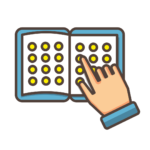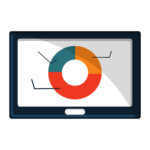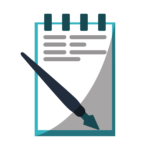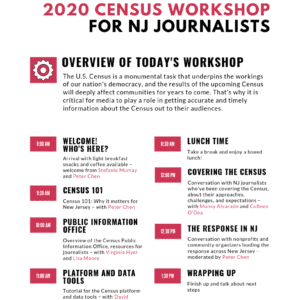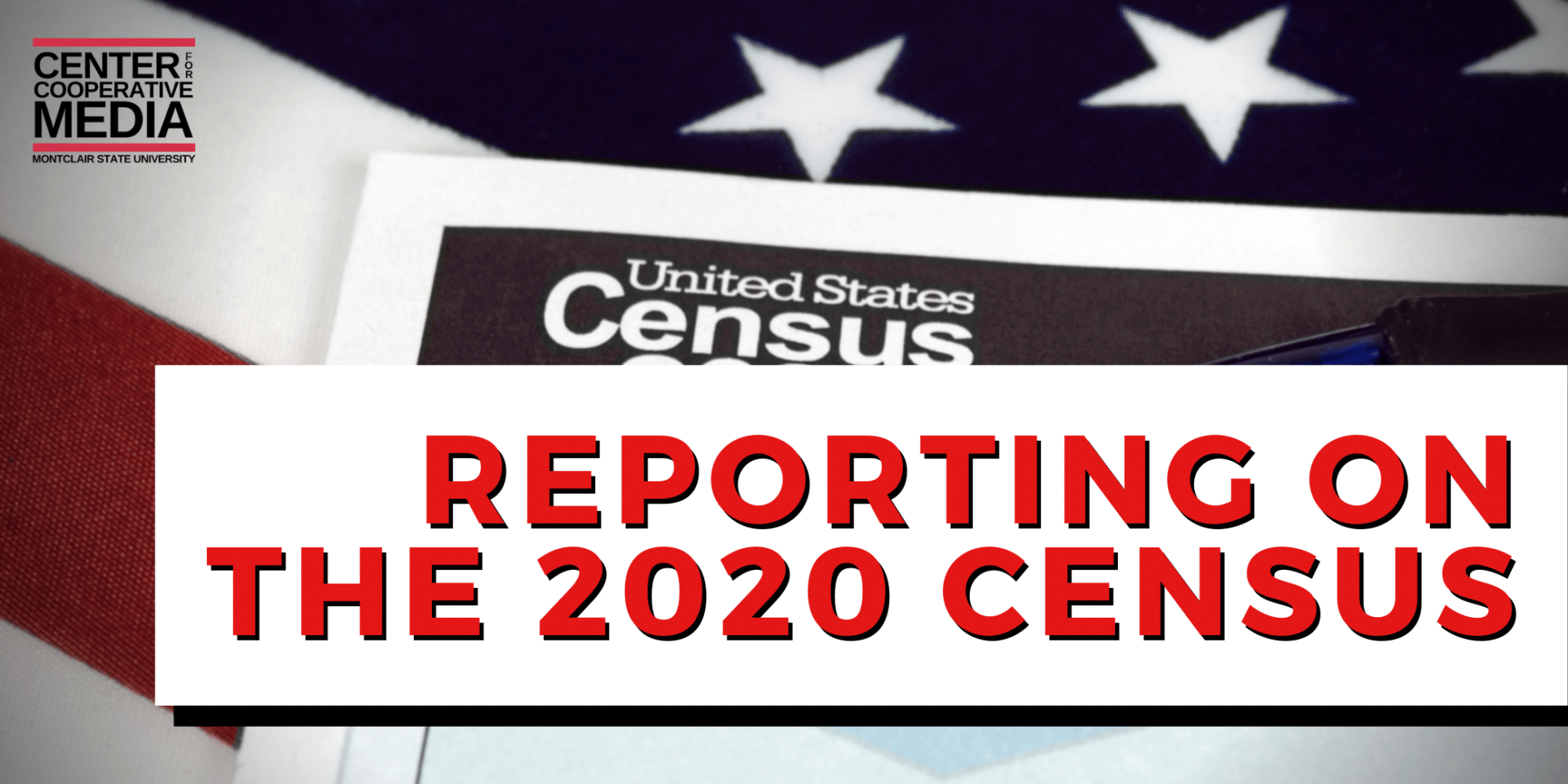This is a guide to help you organize a 2020 Census workshop for local journalists. The information in this guide is based on an August 2019 workshop organized by the Center for Cooperative Media at Montclair State University in New Jersey. The guide is intended to help you quickly organize a similar workshop in your community.
The Census is coming up quickly, and activity will really start picking up speed during the first couple months of 2020, so the time to help local journalists get ready is NOW!
Why host a workshop?
The U.S. Census is a monumental task that underpins the workings of our nation’s democracy, and the results of the upcoming Census will deeply affect communities for years to come. That’s why it is critical for media to play a role in getting accurate and timely information about the Census out to their audiences.
Help other journalists in your area better understand the Census.
Since it only happens once every 10 years, many reporters haven’t covered a Census before. There are also an infinite number of stories that are related to the Census that could intersect with every single beat in your newsroom; in other words, learning about the Census isn’t just for the designated Census reporter. And of course, tools change so much in between each Census that it’s necessary to re-strategize coverage each time.
Drive knowledge about the Census.
We live in an era of misinformation and of proliferation of social media, and people need reliable, accurate information more than ever, especially when it comes to the Census. Hosting a workshop will help drive knowledge- and information-sharing about the Census across your community.
Start organizing
First order of business will be to recruit your most important speakers: Someone from your local nonprofit or community Census coalition and folks from the PIO office at the U.S. Census Bureau.
If you don’t have such a coalition in your state, you could consider asking someone from an active Complete Count Committee member to attend and speak. In New Jersey, we worked with Peter Chen of the Census 2020 NJ Coalition.
For the Census Bureau, we got in touch with the folks in the Washington, D.C., office who had helped coordinate some of Poynter’s Census training earlier this year. To request that Census staffers speak at your training for journalists, contact Virginia Hyer at [email protected] and Christine Taylor at [email protected]. And be sure to CC [email protected] in your email, too, just in case.
We also decided to invite a couple reporters who had been covering the Census to speak, as well as some of the community organizations that had been most active so far with our state’s nonprofit and community coalition.
Craft an agenda
Since Peter had done so much speaking on this topic around our state, we decided he would lead the agenda with a Census overview, focusing on our state’s perspective. This may or may not make sense for your workshop; if it doesn’t, the folks from the Census Bureau can start your workshop with an overview.
You can see our agenda here and a rough outline is below:
- 9 a.m.: Registration, light breakfast
- 9:15 a.m.: Welcome
- 9:30 a.m.: Census overview
- 10 a.m.: Census public information office overview, resources for journalists
- 11:30 a.m.: Lunch
- Noon: Tutorial on the Census platform and data tools
- 12:30 p.m. Conversation with local journalists who had already been covering the Census
- 1 p.m.: Conversation with community organizations involved in Census outreach
- 2 p.m.: Wrap-up
Click here or click the image to see the agenda we created for our workshop.
Find a time and place
We suggest carving out at least three hours for your workshop. The one we held in New Jersey was five hours long. If you need to make it shorter, we’d recommend focusing on the presentations from the Census Bureau and a discussion with your local nonprofit and community coalition. Don’t forget to build in Q+A time. Folks will have lots of questions!
We coordinated our date with our lead speakers, to ensure they could all be there. We settled on a weekday morning for the workshop.
You’ll want a space that has enough seating for all of your guests, is easy to get to (hopefully with nearby parking or public transit), and that has audio/visual capabilities. Try to find a space you don’t have to pay for, if possible; perhaps one of the larger news organizations in your area has a convening space, or one of the community organizations involved in Census outreach. You could work with a local college or university in your area. Local libraries are usually also very active in Census outreach efforts, and they make great partners for workshops, too.
We provided food for our event and recommend you do, too, especially as it’s likely folks will be there for at least three hours. We provided a light breakfast and a boxed lunch.
One other note about timing: We recommend you host your workshop before the end of 2019. The sooner, the better. Advertising about the Census will kick into high gear in January 2020 and people can begin responding to the Census in March. The official Census Day is April 1.
Create a budget
Our event’s cost was a bit on the high side, as we paid for space, linen rentals and some supplies on top of food. Hopefully you’ll just have to cover food and a few basic supplies (including name tags, a printed agenda and a couple directional signs). Depending on how many people you expect and where you are located, some example budgets might look like this:
- $250 – donated meeting space; picking up coffee & tea for the morning; ordering a bunch of pizzas for lunch
- $500 – donated meeting space; coffee, tea, and some light breakfast food; individual boxed lunches
- $1000 – renting the meeting space; coffee, tea, and some light breakfast food; individual boxed lunches
We covered the cost of our workshop with grant funds. If you don’t have access to such funding, consider working with a co-convener who could provide the food or space in-kind. You could also charge participants a registration fee to cover costs, although note that a charge may dampen attendance slightly.
Last, you can also reach out to OpenNews. They have some small grants available to support Census workshops, and can talk through any questions you have about event organizing and logistics. Reach out to [email protected] and they’ll get back to you.
Goodie bags
The Census Bureau staff came loaded with Census stickers, pens and other giveaway items, which was great. They also had folders prepared with some basic Census information. Ask about this when you ask them to attend.
Announce and promote your workshop
We used EventBrite for event registration, and you can see our page here. You are welcome to take our language and modify it for your own registration page! We’re happy to also share the event image if it helps you; we created it in Canva.
Email [email protected].
We find that having folks register in advance gave us a more accurate count of who was going to attend, allowed us to communicate directly with them, allowed us to ask for dietary restrictions, and allowed us to print name tags in advance.
Promote your event far and wide. Be sure to emphasize that the training is not just for the assigned Census reporter, that it will be useful for all news staffers.
Prep for your workshop
We created some basic Google Slides ahead of time for the workshop, and we made sure that all of our presenters either sent us their slides or were prepared to plug in their own computer or jump drive at the workshop. You can click here to view our basic slides and are welcome to modify and use them, too!
We also printed agendas and name tags for our workshop. We used ConferenceBadge.com via EventBrite to print name tags.
Supplies to purchase:
Here’s an incomplete list of supplies and other items we recommend purchasing for your event:
- Name badges and lanyards
- Sharpies
- Sticky notes (for pretty much anything and everything)
- Paper easels (to help document group discussions)
- Program folders (to hold your agenda and event materials)
- Sticky dots (for easy voting)
It’s showtime!
At this point, you should be ready to host your workshop. Good luck!
Follow-up
After the event, we followed up with everyone who had been there to share the presentations and links to items that came up in the discussion.
Have more questions?
We’re happy to help!
We’re sharing this guide to help you, so if you have any questions, don’t hesitate to reach out to the Center! You can email [email protected] and we’ll get back to you.

